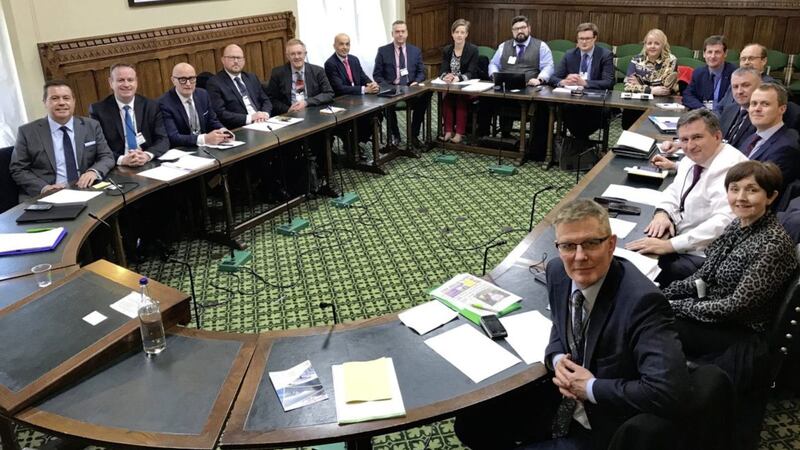BUSINESS leaders in the north have made a last-ditch appeal to MPs to back amendments to the government’s motion on EU withdrawal and break the Brexit deadlock.
And they have reiterated that crashing out of the EU in 60 days without a deal will be "an unmitigated economic disaster".
More than a dozen representatives from Northern Ireland's business, farming, trade union, community and voluntary sectors spent six hours in London speaking directly to the leaders of Labour, Liberal Democrats and the SNP in a bid to stress the need for Westminster to unite and protect jobs, consumers and economy.
"We didn't miss and hit the wall in letting them know the importance of a cross-party consensus to avoid a no deal," Retail NI chief executive Glyn Roberts said last night.
"This was a first for business, coming together as a single voice in such numbers, and it wasn't lost on the politicians."
Over the course of the day they met Jeremy Corbyn (Labour), Sir Vince Cable (Lib Dems) and Ian Blackford (SNP Westminster leader) as well as Secretary of State Karen Bradley and MPs Gavin Newlands and Stephen Gethins.
The business delegate insisted that a stable, predictable economic and political environment is a prerequisite for small business growth and the jobs that this sustains, and a no-deal Brexit would put this at risk.
NI Retail Consortium director Aodhán Connolly told the Irish News: "There was some robust engagement which was necessary to explain the real Brexit consequences for business and households in Northern Ireland.
"If there is a hard border with checks which brings inevitable delays, with customs and with tariffs, then we are talking about the systemic dismantling of the Northern Ireland and Republic of Ireland supply chain that has been built up over this past forty years.
"This will mean cost rises for shoppers across the island of Ireland and Great Britain. These cost rises will hit Northern Ireland worst and affect the most vulnerable consumers most."
His warning came senior executives from Sainsbury's, Asda, Marks & Spencer, Lidl, Waitrose, The Co-op and Costcutter predicted that consumers could face significant disruption to the supply of food if no Brexit deal is struck with Brussels.
Nearly a third of food consumed in the UK comes from the European Union and would be hit by any delays at ports caused by a no-deal Brexit.
The imposition of tariffs and a collapse in sterling as a result of crashing out of the EU could also lead to price hikes for shoppers, they warned.
However, Danske Bank chief economist Conor Lambe predicts that the most likely way out of the current logjam in an approval of a revised version of Theresa May's draft agreement.
In an article in today's Business Insight, he dismisses a no-deal Brexit and a second referendum, writing: "That leaves us with a variant of the draft withdrawal agreement eventually being approved which, in my opinion, is just about the most likely outcome.
"In the days and weeks ahead, the Prime Minister looks set to go back to the EU to try and make some changes to the draft agreement. These discussions are expected to revolve around the Northern Ireland backstop and the political declaration on the future relationship between the UK and the EU.
"There is no doubt these discussions will not be easy. But the two sides are likely to reach some agreement in an attempt to move the Brexit process forward."
He adds: "With Parliament set against a no-deal Brexit, there seeming to be little appetite for another election or a second referendum, and little point in opting for a Norway-style Brexit over full EU membership, it’s quite possible that the House of Commons and the various factions within it will decide to approve an amended version of the draft withdrawal agreement as the only viable, and least unappealing, option."








